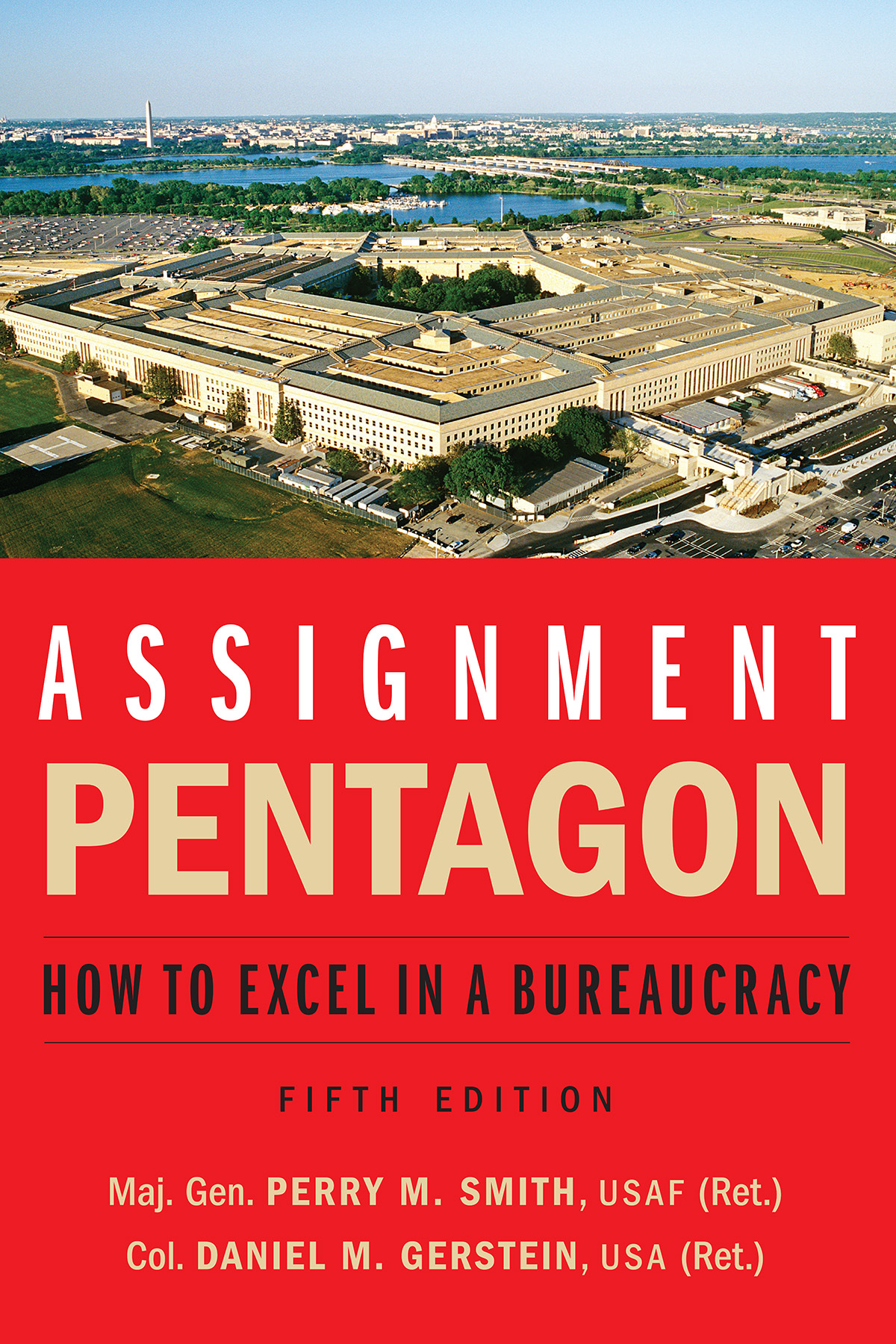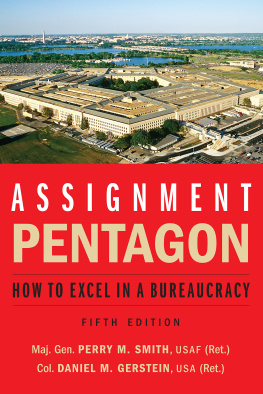
Should be stamped MUST READ and provided to every person headed for a job in the Pentagon.
Gen. John A. Wickham, U.S. Army (Ret.)
A wealth of practical information.
Marine Corps Gazette
The kind of information youd get in an informal conversation with an old Pentagon hand.
Armed Forces Journal International
All military services should add it to their recommended reading lists.
U.S. Naval Institutes Proceedings
Assignment: Pentagon
How to Excel in a Bureaucracy
Fifth Edition
Maj. Gen. Perry M. Smith, USAF (Ret.)
Col. Daniel M. Gerstein, USA (Ret.)
Potomac Books
An imprint of the University of Nebraska Press
2020 by the Board of Regents of the University of Nebraska
Cover designed by University of Nebraska Press; cover image: Alamy Stock Photo / Hoberman Collection.
All rights reserved. Potomac Books is an imprint of the University of Nebraska Press.
Library of Congress Cataloging-in-Publication Data
Names: Smith, Perry M. (Perry McCoy), author. | Gerstein, Daniel M., 1958 author.
Title: Assignment: Pentagon: how to excel in a bureaucracy / Maj. Gen. Perry M. Smith, USAF (Ret.), Col. Daniel M. Gerstein, USA (Ret.).
Description: Fifth edition. | [Lincoln]: Potomac Books, an imprint of the University of Nebraska Press, [2020] | Includes bibliographical references and index.
Identifiers: LCCN 2019054495
ISBN 9781640123564 (paperback)
ISBN 9781640123724 (epub)
ISBN 9781640123731 (mobi)
ISBN 9781640123748 (pdf)
Subjects: LCSH : Pentagon (Va.) | United StatesArmed ForcesManagement. | United States. Department of DefenseManagement.
Classification: LCC UA 26. A 745 S 7 2020 | DDC 355.60973dc23
LC record available at https://lccn.loc.gov/2019054495
The publisher does not have any control over and does not assume any responsibility for author or third-party websites or their content.
To Connor, McCoy, and Serena, who lifted me up so many times during those years I worked in the Pentagon. Their gentle reminders that what I was doing was important helped me overcome the setbacks, the down times, and the frustrations that are part of everyday life in the Building.
To Kathy, Sarah, and Rachel, who saw Pentagon service from a different vantage point, and for the members of the Armed Forces who have to implement the policies and directives that come out of this five-sided building.
Contents
Since the first edition of Assignment: Pentagon was published in 1988, great changes have occurred in the international environment, our national security strategy, and the manner in which the Pentagon functions and contributes to the security of the United States.
The first edition was written when the Cold War was in full swing, the Reagan administration had been pumping funds into the Department of Defense for seven years, and the American militarys renaissance was moving forward at almost a breakneck pace.
The second edition was published in 1992. The world had changed dramatically in just four years. The Berlin Wall fell in 1989, the Gulf War of 1991 was successfully prosecuted, and the Soviet Union had collapsed and broken into pieces. The Cold War was over, and almost everyone understood that a new era had begun.
Likewise, the third edition was written at a key point in our nations history and published in the early years of the new century. The military had been significantly downsized, and the percentage of the U.S. gross domestic product ( GDP ) allocated to national defense was cut in half (from 6 percent under Reagan to 3 percent at the end of the Clinton administration). With no single enemy on which to focus, planning and policy making were more complex and seemed less pressing. The military forces were much smaller, but the commitments had increased, and as the new century got under way, all of the Services had been drastically overextended.
The fourth edition reflected changes in the Pentagon resulting from our nation and military being immersed in fighting the two longest wars in American history. Following the tragic events of September 11, 2001, the United States once more turned to its top political and military executives for inspiration and leadership. On that fateful day two hijacked airliners slammed into the World Trade Center in New York City, one crashed into the Pentagon, and another smashed into the farmland of western Pennsylvania. At least 189 people died at the Pentagon that day. Terrorists brought war to the United States in a frightening and dramatic fashion. In the ten years prior to the attack, much had been done to counter terrorism at home and abroad, but this surprise attack on Washington and New York was a stark reminder to Americans that much more had to be done.
This fifth edition has been updated to reflect the realities of the world today. The military has emerged from the longest conflicts in our history and entered a growing competition with near-peer competitors, Russia and China. These realities also reflect that for some fifteen years the United States and its military have focused on conflicts in Afghanistan and Iraq, confronting a different kind of enemy and military engagements that vacillated between small-unit engagements and nation-building. During this fifteen-year period, thoughts of and preparations for large-scale military warfare have taken a backseat to the more immediate operations. The militarys equipment has aged dramatically because of the high operational tempo of the last decade and a half and must be recapitalized or modernized to be ready for addressing the challenges of today and tomorrow.
Several cultural and structural changes have occurred, such as the growing importance of special operations forces, the creation of the U.S. Cyber Command, the perceived inadequacy of the Department of Defense research, engineering, and procurement systems to deliver timely capabilities for the Joint force, and the inclusion of the National Guard Bureau as a member of the Joint Chiefs of Staff.
In late 2019 the world was confronted with a global pandemic caused by a novel coronavirus. The rapid spread of the virus affected 210 countries and territories. The U.S. military was not immune to these affects. Military training was canceled, and operations were scaled back. The aircraft carrier Theodore Roosevelt was ordered to Guam after the ships captain was relieved following the release of a letter to his superiors warning of the infection of members of the crewover a quarter tested positive for the virus. The military also provided Defense Support to Civil Authorities (DSCA) such as the deployment of the U.S. Navy hospital ships Comfort and Mercy, support to the Federal Emergency Management Agency (FEMA), and the construction of makeshift hospitals by the U.S. Army Corps for aiding affected communities. National Guard forces also supported the states governors.
Still, the magnitude of the national emergency exposed weaknesses in our nations preparedness and response capabilities and demonstrated our broader vulnerability. In the aftermath of Covid-19, we should expect to see a reevaluation of many of our national systems. The military should expect to receive scrutiny during this examination. Some have even questioned whether the definition of national security needs to be changed. Others have questioned whether federal spending should be reconsidered to more highly prioritize public health. No doubt, it will fall to the Pentagons leadership to navigate this uncharted territory.
Next page









